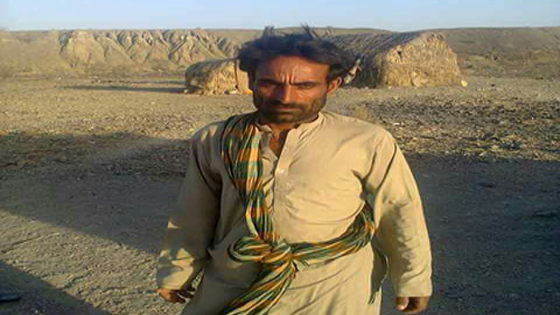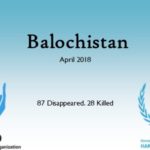The body of previously disappeared Azim Dad Shah, resident of Malar, district Awaran, was found dumped on a roadside in Hub Chowki, district Lasbella, on 05 May, 2018.
He was abducted by security forces on 25 April, 2016, from Jinnah International Airport Karachi.
Meanwhile, gunmen attacked a burial procession in the Mand town of district, Kech, killing one and injuring three on 4 May 2018. The dead has been identified as Khalil Baloch, a resident of Soro, Mand.
The wounded were taken to hospital in the Turbat city where the hospital management reportedly refused to treat them, saying they had orders from the military not to admit the wounded persons of the incident.
The funeral procession was of 23 years old Atif Yousuf, who was killed earlier in a battle between the gunmen and BLF fighters. Atif was said to be a commander of Balochistan Liberation Front (BLF), an armed group that calls itself Freedom Fighters and campaigns to gain ‘freedom from Pakistan through armed struggle’. Yar Mohammad of the opposite group was also killed in the same battle.
The gunmen responsible for the attack belong to a private militia led by Babu Tapari, who eyewitnesses claim was among the attackers. His militia is blamed to be working in collaboration with the military to counter a nationalist insurgency in the area.
Six persons working on an installation of a network company were shot dead in Kharan area of Balochistan on 03 May 2018. United Baloch Army, another armed group that campaigns for ‘freedom of Balochistan from Pakistan via armed struggle claimed responsibility for the attack, saying these projects are part of exploitation of Balochistan and would not be allowed at any cost.
Chief Justice of Pakistan took notice of six killed in Kharan, while said nothing on rest of the murder cases including previously abducted Azim Dad Shah.
Besides, on 08 May, security forces conducted a military operation in Bahot Chath, Mazan Band and Sibdan areas of Dasht, district Kech.
Akram Sayad, Mulla Bashir Karim Bakhsh, Jahanzib Akram and Khalil Umed Ali were abducted from Bahot Chath. Wahid Jalai, Nadil Rahim Bakhsh and his Brother Shakil were abducted from Sibdan. Haji Khuda Bakhsh and Yasin were abducted from Mazan Band.
On 07 May, forces abducted Zahid Abid from Rind Bazar, Dasht district Kech.
On 04 May, security forces abducted Noor Bakhsh Sher Mohammad, Rustum Karim Dad and his brother Suhail from Bal area of Thank Handh, Hoshab, district Kech.
On 02 May, forces and personnel of intelligence agencies raided a house in Askani district Kech and abducted Bakhtiyar Bhaiyan and Guhram Wahid Bakhsh, residents of Kolwa district Kech.
All the abductees have been shifted to unknown locations and their whereabouts remain unknown to their families.
The Pakistan military adopted a policy of enforced disappearances to stifle a Baloch nationalist struggle for political and economic rights.
Since 2005, thousands of Baloch activists, poets, students, rights activists and others have been forcibly disappeared. The military keeps their whereabouts unknown and subjects them to torture for months.
In 2009, the situation got worse. The Pakistan military abducted three key Baloch leaders, including Ghulam Mohammad Baloch who was the President of the Baloch National Movement (BNM), from the Turbat city of Balochistan on April 3, 2009. In a week, on April 9, their tortured and bullet-riddled bodies were found dumped near the Turbat city.
It was the beginning of the military’s now infamous kill-and-dump operations, in which they abduct political activists, journalists, educationists, student activists and human rights defenders, and later dump their bodies in desolated areas.


